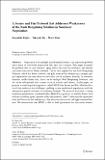A Secure and Fair Protocol that Addresses Weaknesses of the Nash Bargaining Solution in Nonlinear Negotiation
Author(s)
Fujita, Katsuhide; Ito, Takayuki; Klein, Mark
Download10726_2010_Article_9194.pdf (872.8Kb)
PUBLISHER_POLICY
Publisher Policy
Article is made available in accordance with the publisher's policy and may be subject to US copyright law. Please refer to the publisher's site for terms of use.
Terms of use
Metadata
Show full item recordAbstract
Negotiation with multiple interdependent issues is an important problem since much of real-world negotiation falls into this category. This paper examines the problem that, in such domains, agent utility functions are nonlinear, and thereby can create nonconvex Pareto frontiers. This in turn implies that the Nash Bargaining Solution, which has been viewed as the gold standard for identifying a unique optimal negotiation outcome, does not serve that role in nonlinear domains. In nonlinear domains, unlike linear ones, there can be multiple Nash Bargaining Solutions, and all can be sub-optimal with respect to social welfare and fairness. In this paper, we propose a novel negotiation protocol called SFMP (the Secure and Fair Mediator Protocol) that addresses this challenge, enabling secure multilateral negotiations with fair and pareto-optimal outcomes in nonlinear domains. The protocol works by (1) using nonlinear optimization, combined with a Multi-Party protocol, to find the Pareto front without revealing agent’s private utility information, and (2) selecting the agreement from the Pareto set that maximizes a fair division criterion we call approximated fairness. We demonstrate that SFMP is able to find agreements that maximize fairness and social welfare in nonlinear domains, and out-performs (in terms of outcomes and scalability) previously developed nonlinear negotiation protocols.
Date issued
2010-03Department
Massachusetts Institute of Technology. Center for Collective Intelligence; Sloan School of ManagementJournal
Group Decision and Negotiation
Publisher
Springer Netherlands
Citation
Fujita, Katsuhide, Takayuki Ito, and Mark Klein. “A Secure and Fair Protocol That Addresses Weaknesses of the Nash Bargaining Solution in Nonlinear Negotiation.” Group Decis Negot 21, no. 1 (March 3, 2010): 29–47.
Version: Author's final manuscript
ISSN
0926-2644
1572-9907